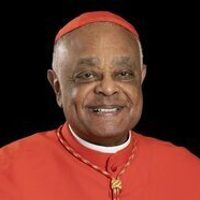There is a personal grace that I have found when distributing the Eucharist that has provided me with so many wonderful spiritual insights over the years since I have been an ordained minister for our Church. The great privilege of sharing the sacrament of Christ with His people has given me many gracious opportunities to personally understand better the value and the importance of this cherished gift of Christ Himself in the Eucharist.
I have found that people say and do many touching things when they receive the Eucharist. Whether they receive the Lord in their hands, or on their tongues, standing or kneeling, they approach this blessed gift in many humble ways. One of the most charming encounters takes place when little ones, carried in the arms of a parent who is receiving Communion, open wide their own mouths to receive a share of Christ’s Body – this happened several times during the Home School Family Mass this past Sunday at the Basilica of the National Shrine of the Immaculate Conception. Like little birds anxious to receive the same gift as a parent, they remind me that we should all long for this sacrament. While they are not quite yet ready for Communion, their innocent gesture is a reminder of how this blessed nourishment is truly a gift ardently to be desired. This gesture should remind parents of their responsibility to prepare their children for that time when they are ready to receive Christ in this sacrament.
Occasionally, a married couple will approach the Eucharist side-by-side – even holding hands as a sign of their married union that is strengthened by the Lord’s own gift of self. The aged and infirmed sometimes need our assistance and support as they approach the altar or wait for Communion to be brought to them. They too are an impressive symbol of how the Church must continue to strengthen and to accompany those who seek the Lord. First Holy Communicants are a universally cherished sign and reminder of the excitement we all felt when first we received the Lord’s Eucharist.
The other day, during the opening Mass at Don Bosco Cristo Rey High School, a young man approached me with his hands crossed in front of his chest – the commonplace symbol of one who was not coming for Communion but for a prayer of blessing. When I gave him a brief blessing he said – “I need Communion.” Perhaps he was temporarily confused with the gesture that he made, but he was absolutely correct in his response – that he needed Communion. I continued to reflect on that youngster’s utterance long after the ceremony – how perfectly right he was to say that he needed the Eucharist. We all NEED the Eucharist, from the archbishop to the youngest communicant. The Eucharist is the Church’s very source of life.
Recently, there has been an ongoing commentary on the issue of the disturbing lack of acceptance of the Church’s teaching regarding the real presence of Jesus Christ in the Eucharist on the part of too many Catholics. Statistics are cited suggesting that many of our people have lost an appreciation of this great mystery. Some studies suggest that large numbers of Catholics do not understand – or worse yet – do not believe that Christ is truly present in the Blessed Sacrament. Not only can they not articulate the Church’s teaching on the Eucharist, they do not accept as true that the Lord is present Body, Soul, Divinity and Humanity under the forms of bread and wine.
There are many evoked reasons for this increase in the absence of belief on the part of some Catholics. Some attribute it to meager and insufficient catechesis, a decline in Church involvement, intensified secularization of society, or simply a loss of trust in the Church and therefore in the doctrine of this central mystery of our faith. Each proposed reason may hold an element of truth, but a stronger response is required beyond dogma. Better and more frequent catechesis on the Eucharist is essential. But in addition, religious practices that underscore what the Church believes are also necessary – such as Eucharistic Adoration, the celebration of rituals that highlight the uniqueness of this sacrament – Corpus Christi processions, 40 hours’ devotion, etc. All of these traditions and new developed Eucharistic practices will underscore for the faithful what our doctrine expresses. We need both better and more frequent teaching as well as increased visible confirmation of what we teach to help people recover what may have been lost to them over time.











